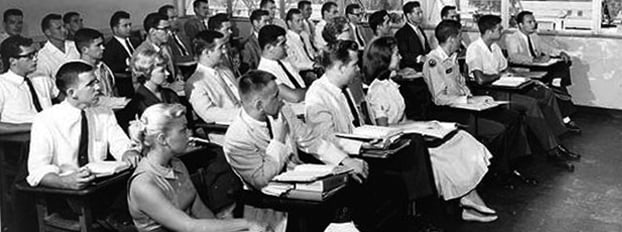
Those Films You Saw in School
Remember the old black-and-white educational films of the 1940's and 1950's,
with titles like, "Dating Do's and Don'ts," and "Appreciating Our Parents?" Nowadays
these films, known as "social guidance" or even "mental hygiene" films,
are considered campy and simplistic, but in their day, they were the ideal
teaching tool used in schools.
The originator of this genre was Coronet Films in Glenview. To company
founder David Smart, the postwar 1940s cried out for educators to guide
students through their youthful distress by teaching values. Beginning
in 1947, Coronet produced scores of films offering just such advice, like "How
Do You Know It's Love?," "Improve Your Personality," and "Good Table Manners."
Other local filmmakers including Encyclopedia Britannica quickly followed
Coronet's lead, shooting many of their productions on the streets of Chicago
and neighboring suburbs.
These products of Chicago filmmakers helped generations of American children
grapple with serious personal issues. Were they idealistic?-yes. Impractical?-again,
yes. But, did they offer wisdom? Indeed, these shorts contained distillations
of practical Midwestern sensibility. Without being preachy, they offered
models in proper living. Whether accepted or rejected by youthful viewers,
the basic message of these Chicago filmmakers endures: how to find a comfortable
balance between the demands of the individual and the society.
Media archivist Rick Prelinger released in 1996 a 12 CD-ROM set, "Our
Secret Century: The Darker Side of the American Dream," containing
160 instructional films. (There's also a less overwhelming single-CD companion
piece called "Ephemeral Films.") "They're far more important
than feature films," Prelinger argues.
When Chicago Taught the Nation
By J. Fred MacDonald
At first glance, the school films made in Chicago in the 1940s and 1950s
may seem hopelessly unrealistic. The Pleasantville world they project is
predictable and therefore easily repairable. It is a Caucasian fantasy
of small towns and suburbs where families are idealized, young people respect
their teachers and elders, and towns are communities where friendly people
constructively interact. Here, children strive to improve themselves: their
studies, their manners, their interpersonal relationships. There is minimal
disharmony in this worldview, except, of course, for the problem that prompted
the making of the film-but, that incivility is resolved in about 10 minutes.
In retrospect, it all seems so campy: an awkward lunge for that goodnight
kiss, a boisterous preacher excoriating nicotine, a girl warned against
red nail polish because it would accentuate her stubby fingers. Amusing,
yes-but not to be ridiculed. These films embodied the voice and value-system
of American parents in the first decades of the baby boom. Using the inexpensive,
ubiquitous medium of 16mm film, Coronet , Encyclopedia Britannica, and
the other Chicago movie companies communicated that parental consensus,
assisting American educators in their roles both as teachers of subject
matter and as civic agents operating "in loco parentis."
To be commercially attractive to schools and libraries throughout the nation,
school films in the 1940s and 1950s could not challenge social mores. They
were not instruments of social transformation. These films would change
only if and when American society changed--and that would have to emerge
from debate within the society itself.
Still, despite their simplistic contexts, school films communicated socially-responsible
messages. And these messages are still being taught in homes and schools
many decades later. What parent does not want a dating daughter treated
with respect by her escort? Children still require instruction in proper
table manners and the fundamentals of good grooming. The drug problem has
only worsened since the 1950s requiring even greater adult intervention
than the old films proposed. "Stop, look, and listen before you cross
the street" or "teenicide" may sound amusingly quaint today,
but abuse the rules of the road as a pedestrian or driver and you have
a good chance of being struck by an automobile.
So, laugh at their superficial gloss, as one might snicker at clothing
styles worn in earlier times. But beneath the surface, much is unchanged.
Laughing at school films from our youth does not mean they were wrong-or
that we have solved the problems they recognized. It does not mean that
society in middle of the last century was "square" and today
we are "way cool." Style changes, but social dilemmas endure.
And so we are left with the realization that those school films did not--perhaps
could not--solve the problems of their era; and that we must fashion our
own style in addressing most of those same problems because we have seen
the past and it is us.
Dr. J. Fred MacDonald is Professor of History, Emeritus at Northeastern
Illinois University in Chicago. He holds Bachelors and Masters degrees
in History from the University of California at Berkeley, and a Doctorate
in History from the University of California at Los Angeles. He wrote and
produced the "Those Films You Saw in School" installment of Chicago
Stories.

Your $40 Gift Membership will include:
|
























































